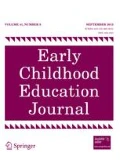Abstract
Mental health professionals have speculated that their consultation services should improve the overall quality of a child care center, but few research studies have shown this effect in child care settings. In the present study, mental health consultation services were provided by four agencies to 25 urban child care centers to enhance children's emotional lives and social abilities, and to strengthen child care center staff's capacity to work with children who have difficult behaviors. A one-year evaluation was conducted to assess the impact of the mental health services on the teachers and child care centers using observational measures, director- and teacher-completed questionnaires, and qualitative focus group data. Centers with more than one year of consultation showed increases in overall quality, teachers' self-efficacy, and teachers' competence. In addition, staff expressed satisfaction with the mental health consultation services provided. Implications of findings and suggestions for future interventions are discussed.
Similar content being viewed by others
REFERENCES
Alkon, A., & Sokal-Gutierrez, K. (2002). Child care health consulta-tion improves health knowledge and compliance. Pediatric Nursing, 28(1), 61–65.
Bandura, A. (1977). Self-efficacy: Toward a unifying theory of behavioral change. Psychological Bulletin, 84, 191–215.
Campbell, S., & Ewing, L. (1990). Follow-up of hard-to-manage preschoolers: Adjustment at age 9 and predictors of continuing symptoms. Journal of Child Psychology and Psychiatry, 31(6), 871–889.
Center for Mental Health Services, Substance Abuse and Mental Health Services Administration, & Services, U.S. Dept. of Health and Human Services. (2000). Early childhood mental health consultation (monograph). Washington, DC: National Technical Assistance Center for Children's Mental Health, Georgetown University Child Development Center.
Cost, Quality and Outcomes Study Team. (1995). Cost, quality, and child outcomes in child care centers, public report (2nd ed.). Denver: University of Colorado.
Earls, F. (1980). Prevalence of behavior problems in 3 year old children. Archives of General Psychiatry, 137, 153–157.
Egeland, B., Kalkoske, M., Gottesman, N., & Erikson, M. (1991). Pre-school behaviour problems: stability and factors accounting for change. Journal of Child Psychology and Psychiatry, 31, 891–909.
Geller, S., & Lynch, K. (1999). Teacher opinion survey. Richmond: Virginia Commonwealth University Intellectual Property Foundation and Wingspan, LLC.
Gibson, S., & Dembo, M. (1984). Teacher efficacy: A construct validation. Journal of Educational Psychology, 76(4), 569–582.
Greenwood, G., Olejnik, S., & Parkay, F. (1990). Relationships between four teacher efficacy belief patterns and selected teacher characteristics. Journal of Research and Development in Education, 23(2), 102–106.
Harms, T. & Clifford, R. M. (1980). Early childhood environment rating scale. New York: Teachers College Press.
Johnston, K. (2000). Inclusivity in mental health consultation to the community. Zero to Three, 20(4), 15–18.
Knitzer, J. (2000). Early childhood mental health services. In J. a. M. Shonkoff, S.J. (Ed.), andbook of early childhood intervention (2nd ed., pp. 416–438). New York: Cambridge University Press.
Koot H., & Verhulst, F. (1992). Prediction of children's referral to mental health and special education services from earlier adjustment. Journal of Child Psychology and Psychiatry, 33(4), 717–729.
Lieberman, A. (2000). Using a mental health perspective to educate and support community partners. Zero to Three, 20(5), 27–28.
Luk, S., Leung, P., Baconshone, J., et al. (1991). Behaviour disorder preschool children in Hong Kong: A two stage epidemiologic study. British Journal of Psychiatry, 158, 213–221.
Mark-Wilson, P., Hopewell, A., & Gallagher, J. (2002). Perceptions of child care professionals in California regarding challenging behaviors exhibited by young children in care: Findings and recommendations of focus group study. Washington DC: Health Systems Research, Inc.
NIMH Prevention Research Steering Committee, I. C. o. P. o. M. D., NIMH Ad Hoc Committee on Prevention Research. (1996). A plan for prevention research for the National Institute of Mental Health (96–4093). Washington, DC: National Institutes of Health, National Institute of Mental Health.
Pavuluri, M., Luk, S., & McGee, R. (1995). A community study of preschool behaviour disorder in New Zealand. Austrialian New Zealand Journal of Psychiatry, 29(3), 454–462.
Pavuluri, M., Luk, S., & McGee, R. (1996). Help-seeking for behavior problems by parents of preschool children: A community study. American Academy of Child and Adolescent Psychiatry, 35(2), 215–222. Proceedings of the Second Annual UCLA National Conference on
Preventive Psychiatry. (1988). Promoting mental health in early child care settings. Paper presented at the Second Annual UCLA National Conference on Preventive Psychiatry, University of California, Los Angeles.
Raver, C., & Knitzer, J. (2002). Ready to enter: What research tells policymakers about strategies to promote social and emotional school readiness among three-and four-year-old children. New York: National Center for Children in Poverty, Mailman School of Public Health, Columbia University.
Stein, M., & Wang, M. (1988). Teacher development and school improvement: The process of teacher change. Teaching and Teacher Education, 4(2), 171–187.
Weiss, J., & LaRoche, C. (1989). The role of child psychiatrists as consultants to day cares. Canadian Journal of Psychiatry, 31, 589–593.
Whitebrook, M., Howes, C., & Phillips, D. (1989). The National Child Care Staffing Study—Who cares? Child care teachers and the quality of care in America. Washington, DC: National Center for the Early Childhood Work Force.
Whitebrook, M., Howes, C., & Phillips, D. (1998). Worthy work, unlivable wages: The National Child Care Staffing Study, 1988–1997. Washington, DC: Center for the Child Care Workforce.
Yoshikawa, H. (1994). Prevention as cumulative protection: Effects of early family support and education on chronic delinquency and its risks. Psychological Bulletin, 115(1), 28–54.
Yoshikawa, H., & Knitzer, J. (1997). Lessons from the field: Head Start mental health strategies to meet changing needs (report). New York: National Center for Children in Poverty, Columbia University Mailman School of Public Health.
Author information
Authors and Affiliations
Corresponding author
Rights and permissions
About this article
Cite this article
Alkon, A., Ramler, M. & MacLennan, K. Evaluation of Mental Health Consultation in Child Care Centers. Early Childhood Education Journal 31, 91–99 (2003). https://doi.org/10.1023/B:ECEJ.0000005307.00142.3c
Issue Date:
DOI: https://doi.org/10.1023/B:ECEJ.0000005307.00142.3c



